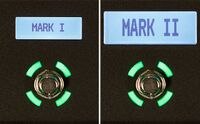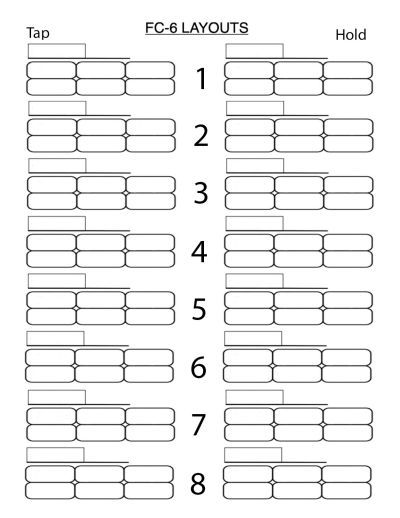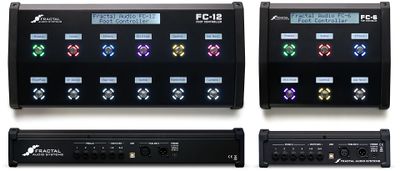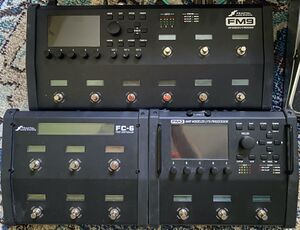This is the wiki for products made by Fractal Audio Systems, maintained by members of the community.
November 2025: wiki now covers the AM4 too.
FC-6 and FC-12 foot controllers
Contents
- 1 References
- 2 FC-6 and FC-12 controllers
- 3 Mark II Series
- 4 Specifications
- 5 Firmware
- 6 Connectivity
- 7 Operating
- 7.1 Configuration on the processor or in the editor
- 7.2 Resetting system parameters resets the foot controllers
- 7.3 Back up and restore
- 7.4 Show preset and scene numbers
- 7.5 Inverted displays
- 7.6 Compatibility Mode
- 7.7 Assign switches
- 7.8 Control Switches
- 7.9 Tap and Hold
- 7.10 Smart Bypass
- 7.11 Layouts
- 7.12 Layout Views
- 7.13 Master Layout Menu (MLM)
- 7.14 Per-Preset switches
- 7.15 OMG layouts
- 8 Songs and setlists
- 9 Tips, tricks and troubleshooting
- 10 Videos
References
These are recommended reading or resources:
- The FC-Controller's product page.
- The Fractal Audio Getting Help, Articles and Downloads pages.
- Owner's Manual, Quick Start Guide, Foot Switch Functions Guide, Setlists & Songs Mini Manual.
- The forum's FC-12 and FC-6 Controllers sub-forum.
FC-6 and FC-12 controllers
Fractal Audio's FC-6 and FC-12 foot controllers let you control the Axe-Fx III, FM9 and FM3. The FM3 and FM9 support two FCs, and the Axe-Fx III supports four FCs. The FC controller and the editor are both clients to the processors. Switching on one client will automatically update all other connected clients and the Axe-Fx III, FM3 or FM9 itself.
The FC-6 is the same size as an FM3. The FC-12 is the same size as an FM9. The only difference between the FC-6 and FC-12 is the number of available switches.
FRACTAL AUDIO QUOTES
[1] The entire product line was conceived years ago. The goal was to maximize the number of parts shared between products. The footswitch PC boards do three switches each. An FM3 has one board. An FC6 has two. An FM9 has three and an FC12 has four. All products use the same LCDs, encoders, side plates, etc., etc. This reduces cost and repair inventory. The FC6 and the FM3 are basically the same enclosure. The FC12 and FM9 are basically the same enclosure. This isn't a huge market. Margins are thin so you have to think of ways to minimize development and product costs. Parts bin methodology is the route we took on this generation.
You can hook an FC-6/12 to it. So for small gigs/rehearsals use the FM-3 alone. For larger gigs connect an FC (or two).
[2] If anyone is curious the thought process was this:
- FM3 alone for rehearsals, small gigs.
- FM3 plus FC6/12 for larger gigs.
- Axe-Fx III plus FC6/12 for MSG. (Madison Square Garden)
Since the FC6/12 are "thin clients" you can exchange them with the Axe-Fx III and FM3 without having to do any programming.
Mark II Series
The Mark II series are equipped with larger and easier-to-read footswitch mini-displays
. The height of individual characters of text is doubled from 4.6mm to 9.2mm, as well as being presented in a bolder and more readable font. Six or twelve individual mini-displays have grown from 1.4” x 0.5” (36.0mm x 12.5mm) to 1.9” x 0.7” (50.0mm x 17.5 mm). The overall product dimensions and weight remain the same as the original versions.

Specifications
Dimensions
FC-6 — 11.2” x 9.2” x 3.5” (283mm x 233mm x 88mm). Weight: 6.7 lbs (3 kg).
FC-12 — 20.2” x 9.2” x 3.5” (512mm x 233mm x 88mm). Weight: 11 lbs (5 kg).
FRACTAL AUDIO QUOTES
[3] The FC-6 is roughly the size of a sheet of paper.
[4] The switches are 3" apart on the FC's
Technical drawings (Mark I):
Comparing the size of the FC controllers (Mark I and II) to the FM3:
Displays
The main display shows up to twenty characters per row in two rows. The mini displays show up to eleven characters.
In the FC's configuration you can disable the display of preset and scene numbers to allow more space for names.
FRACTAL AUDIO QUOTES
[5] They are graphic displays so the number of characters depends on the size of the font.
[6] The scribble strips are black/white.
[7] The foot controllers use "transflective" displays that work in any light. The LED rings will wash out in intense light, no way around that. We tested them outside and they were pretty visible even in bright sunlight though. They have adjustable intensity.
[8] All the displays are transflective so they don't wash out under bright light.
[9] The LCDs are transflective, meaning they are visible in complete darkness to full, direct sunlight.
LED rings
The intensity (brightness) of the switch rings can be set in the configuration.
FRACTAL AUDIO QUOTES
[10] The LED rings are different colors based on function.
Switches
FRACTAL AUDIO QUOTES
[11] The switches aren't conventional switches. They are capacitive sense switches. If you hold down a switch during boot you mess up the calibration routine. Don't do that.
Firmware
The FC controllers rely on internal firmware for basic low level functions. This may require an update from time to time, but only when Fractal Audio says so. Watch the FC main display during startup to see its current internal firmware version.
Dedicated firmware for the FC must be installed through an Axe-Fx III, FM9 or FM3, to which the FC controller is connected. Launch Fractal-Bot, select the processor, select the firmware file, and start the upgrade process. Installation instructions are included in the firmware .zip file.
The current firmware is available on the Downloads page.
Note that the Mark I and Mark II series of the FC controllers have different firmware.
Firmware for the Axe-Fx III, FM9 and FM3 can also include FC improvements.
Connectivity
FASLINK
FASLINK is the bidirectional communications protocol that links the Axe-Fx III, FM9 and FM3 to FC controllers, using a single XLR (microphone) cable. The first connected FC controller gets its power from the processor and can be daisy-chained. Read FASLINK for more information.
FC controllers can't be used with the Axe-Fx II. The communications protocol is completely different, and the FC controllers do not support FASLINK version 1, MIDI or Ethernet/EtherCON.
MIDI
The FC controllers don't have MIDI ports and can't be used by themselves to control MIDI devices directly.
However, the connected processors have MIDI OUT ports. The FC controller can initiate MIDI operations through Control Switches, which are transmitted via the MIDI OUT port on the processor, or via the Scene MIDI block.
FRACTAL AUDIO QUOTES
[12] The system has a MIDI jack. It's on the Axe-Fx III! Actions on the foot controller can cause MIDI to be transmitted to downstream devices.
USB
The USB port on FC controllers is not in use, currently.
FRACTAL AUDIO QUOTES
[13] Future expansion. Currently it does nothing but in the future we may enable it so it can be a "USB MIDI Controller".
Expression pedals
The FC controllers allow connecting up to four expression pedals with TRS cables. You can assign functions to these pedals, separately from the expression pedal ports on the Axe-Fx III, FM9 or FM3 itself. Calibration and configuration of the pedals is done through the FC Controllers menu under Setup menu.
For more information read Expression pedals and external switches.
External switches
The FC controllers allow connecting up to four external switches. Use a TS cable for a single switch (all devices), and TRS for dual switches. Configuration is done through the FC Controllers menu under Setup.
Read Expression pedals and external switches for more information.
FRACTAL AUDIO QUOTES
[14] STAND IN SWITCHES - This feature broadens the capabilities of external footswitches on the FC-6 or FC-12. An external switch can operate globally as a “remote control” for any switch in any FC layout. For example, imagine an FC where Layout 6/Switch 1 has been set to "BANK +1" (tap) and "BANK -1" (hold). When we assign an FC External Switch as a stand-in for Layout 6/Switch 1, that external switch performs the bank up/down functions, even when Layout 6 is not loaded on the FC. The stand-in is an exact surrogate for the onboard switch, and can even be used with per-preset functions. Find the “Stand-In Switches” page in the “FC Controllers” menu under SETUP. NOTE: Momentary switches will probably be preferred for use as stand-ins, because they more closely mimic the behavior of the on-board switches. Note: Stand-in switches only work with external switches, not the expression pedals ports.
SWITCH BEHAVIOR - The "Switch Behavior" setting determines how an FC external switch operates a connected device. A switch with the default setting of "Follow Hardware" behaves exactly as you might expect: a latching switch latches, and a momentary switch is momentary. If you want a momentary switch to behave like a latching/toggle switch instead, use the "Virtual Toggle" option. Now, every time you tap the switch, its state on the Axe-Fx or FM3 will flip from ON to OFF, or OFF to ON. Note that if you accidentally apply the Virtual Toggle setting to a physical latching switch, you'll need to tap the switch twice for it to toggle. Find this option for every FC external switch on the “Remote” page of the “FC Controllers” menu under Setup.
SWITCH POLARITY - The FC offers the option to reverse the polarity of any connected switch. The option “Normal” assumes a “momentary make” switch. Use the option “Reverse” when using a “momentary break” switch, or for creative applications. Find this option for every FC external switch on the “Remote” page of the “FC Controllers” menu under Setup.
Operating
Configuration on the processor or in the editor
Go to FC controllers in the Setup menu or use the FC-Edit and FC Per-Preset in the editor.
The Per-Preset configuration menu on the Axe-Fx III, FM9 and FM3 is reached via the Controllers menu.
Note that some parameters may be available on the hardware only.
FRACTAL AUDIO QUOTES
All configuration data is stored in the Axe-Fx III. There is no management software needed for the FC. Configuration is done via the Axe-Fx III (or Axe-Edit).
Resetting system parameters resets the foot controllers
Executing Reset system parameters on the Axe-Fx III, FM9 or FM3 will also reset the FC's configuration.
Restore a backup, created with the editor or with Fractal-Bot, or restore the default layout using the FC Controllers menu in the Setup menu or the editor.
Back up and restore
Use Fractal-Bot to back up and restore the settings of the FC controller(s).
Use FC-Edit in the editor to back up and restore FC layouts.
Show preset and scene numbers
You can configure whether preset names and scenes are should be preceded by a number in the main display or not.
Inverted displays
You can increase visibility by enabling the “Mini-LCD Invert Mode” option.
Compatibility Mode
Normally, the FC-6 shows the first six switches in two rows, but the FC-12 places these across one row, on the bottom. Therefore, if you create a layout for the FC-12, it will re- arrange itself when viewed on an FC-6, which can be a bit confusing. To prevent this from happening, you can enable "FC-6/FC-12 Compatibility Mode".
Assign switches
EZ Mode lets you tap a switch and then configure its Tap and its Hold functions. Use other tab pages in this menu for advanced configuration, copying and more.
Things you can assign to switches:
- Presets (make sure to also set Bank Size to the correct value)
- Banks
- Scenes
- Effects (engage or bypass)
- Channels
- Tuner
- Tempo
- Looper block
- Control Switches
The FC will sometimes briefly display messages, for example when turning an effect on and off. In the FC configuration you specify the on-display time for these messages.
Tip: an edited preset can be saved during a performance through a foot switch. Assign the function Amp Level + Save with a value of 0 dB.
Control Switches
Switches on the FC controllers can act as Control Switches. Use these to transmit MIDI, or control modifiable parameters.
The FC configuration allows allow adding each of the six Control Switches to a mutually exclusive group. Any switch with Exclusivity enabled becomes a member of a group in which only ONE switch can be turned on at once. Turning any switch in the group ON will turn all others in the group OFF automatically.
Tap and Hold
The switches support two types of action: Tap and Hold.
To engage the Hold function, tap-and-hold the switch.
In the FC's configuration you can set HOLD to either Automatic or Switch Up. Automatic means that the Hold function will kick in after a specified period (default 0.5 sec). The time that a switch has to be held for the Hold function to kick in, can be set. Switch Up means that Hold will kick in after releasing the switch.
The Hold function of a switch is not indicated on the mini display. It's briefly displayed when executing the TAP function. To see the hold function of a switch, assign a switch to Reveal Hold. There's no visual clue when activating the HOLD function.
Smart Bypass
Smart Bypass allows Channel switches to serve double duty by engaging or bypassing an effect. To use this option, stomp again on the footswitch for a currently selected channel. This allows you to set up separate switches for different channels without the need for a separate “Bypass” Switch.
Layouts
The FC controllers provide eight layouts. Similar to pages
and layers
on other controllers, layouts re-map the physical switches (6 on the FC-6, 12 on the FC-12), allowing the use of the available switches for multiple tasks.
Switch to a different layout by pressing an assigned layout
switch in the current layout or by using the Master Layout Menu (MLM).
Layout Linking is a feature that allows any footswitch to also change layouts. For example, if a switch is assigned to recall a preset, it can also switch to the programmed Scenes layout. Layout-Links are the trick behind the FM3's OMG9 factory layout.
To load the factory default layout(s), use the FC Controllers menu under Setup.
The documentation provides a number of layout examples.
FRACTAL AUDIO QUOTES
[15] The FC series are like 12 foot controllers in one. The FC foot controllers feature 12 "layouts". Each layout has a unique, user-assignable set of switch functions. For example Layout 1 could have five preset switches, five scene switches and two switches assigned to bank up/down. Press and hold the bottom right switch and the then tap the switch above it and you enter Layout Select mode. Then tap a switch to select a new Layout. This new layout could have six channel switches and six bypass switches. Etc.
[16] […] You can actually assign a button to Layout so you can get there with a tap. You can also assign a button to bring up a specific layout so you could have two layouts each with a button that switches to the other layout.
And the way the Layout press-and-hold works is that you press one button and while holding it tap the button above. IOW, you press the bottom button with your heal and then tap the button above. Each tap (while holding the bottom button) brings up a new layout.
You can download blank layout templates for the FC-6 and F-12 in .pdf, .jpg formats, and as Google Sheets.

Layout Views
The FM3 has three onboard switches and can't show all twelve switches in a layout, which applies to the FM9 too. Therefore it provides the (Layout) Views feature. This lets you you shift the focus within a layout, like a window.
This is explained in the Owner's Manual.
Master Layout Menu (MLM)
The Master Layout Menu (MLM) shows all layouts on a single page (FC-12) or two pages (FC-6). Recall the MLM by holding the bottom right switch and tapping the switch above it (this can be disabled in the configuration). The FC-6 can display only six layouts at a time, so press the MLM combo switch a second time to reach the remaining layouts. So even, if you forgot to program other layout
switches on your current layout, you can still get out
of the current layout by engaging the MLM.
You can also assign the MLM
switch to any tap or hold switch.
Notes:
- If the lower right switch has a Tap function, it will not be activated by the MLM Switch Combo.
- If the lower right switch has a Hold function, you can still easily execute the MLM Switch before the Hold function kicks in.
The MLM Switch Combo can be disabled in the settings.
On the FM3, the MLM is normally assigned to the Hold function of the middle switch.

Per-Preset switches
The layouts (described above) are global, meaning that they apply to all presets.
If you need preset-specific switches, you can program these in the Controllers > Per-Preset menu. This menu allows you to override global
layout switches.
Per-Preset Switch Overrides can be disabled globally.
OMG layouts
OMG is a set of foot switch layouts for the FM3 when used with a single FC-6 (OMG9
) or FC-12 (OMG15
). It can be installed through Setup > FC Controllers on the Axe-Fx or through Setup > FC Controllers/Onboard Switches > Reset menu on the FM3 running the Cygnus firmware.
See the OMG User Guides for more information.
OMG3 is a variant, created by forum member Patzag, for the FM3 without the FC-6. It is available for download in the forum. OMG3 can be used with an FC-6, effectively making it act as OMG9 by following the instructions in Patzag's update.
The FM9 has its own custom layouts.
Songs and setlists
Firmware release notes:
[17] Added new Setlists/Songs feature, which can be used with an FC Controller to access presets and scenes in custom order during live performance. A new Setup menu area provides full access from the front panel, with a corresponding new area of Axe-Edit which offering import/export and more. For additional details, please see the Setlists & Songs Mini-Manual, located at: Setlists & Songs Mini-Manual.
From the Mini-Manual:
In the world of musical performance, a “setlist” is a list of songs to be performed in order. A setlist structures a show, letting you plan ahead how to start strong, avoid lulls, and finish memorably. Setlists also help band members and crew/techs prepare, minimizing the need for questions or on-the-fly adjustments. A short singer/songwriter setlist might contain 4 songs, while a typical modern rock/pop concert setlist could range from 12 to 25 entries. A working cover band might play multiple sets covering a hundred songs or more in one night.
The Fractal Audio Setlist/Song feature allows you to create an organized setlist comprised of named songs, with each song containing up to six distinct sections (e.g., intro, verse, solo, etc.). By using FC footswitches, you can easily navigate in order through the various sounds required. Song footswitches enable you to select songs, while Section footswitches load the appropriate sections from the current song. Setlist footswitches provide the option to change the “Active Setlist” among four available choices.
Songs consist of links to one or more presets and scenes. Each song can have six links/sections and can be organized into setlists. FC footswitches can change songs in order and present the various scenes needed for named song sections, intro
, verse
, solo
, etc.. Setlists and Songs can be edited through the modeler's front panel or in the editor, which also includes utilities to import, export and more.
The full explanation is provided in the Setlists & Songs Mini Manual.
The Setlist & Songs feature requires an FC-6 or FC-12 Foot Controller. Designated song footswitches allow you to select songs. Section footswitches load sections from the current song. Setlist footswitches allow you to choose different Setlists. This is done in Global > FC Setlists/Songs.
Songs
Each song has a number, an up-to ten character name and contains six numbered sections. Each section has a number, an up-to ten character name, and a designation of one preset and one scene, 1-8 or DEFAULT. Up to 128 songs can be created in total.
Three SONG functions load Songs based on their numbered positions within the active setlist:
- SELECT IN SET
- Loads a song by its numbered position (1–32) in the active setlist.
- TOGGLE IN SET
- Toggles between two songs by their numbered positions in the active setlist.
- INC/DEC IN SET
- Incrementally steps forward or backward through all of the non-empty songs in the active setlist. Empty songs are skipped automatically, and any empty songs at the beginning or end of the list are skipped when the list
wraps
.
Sections
Three SECTION functions load sections from the current song. Whenever a section is loaded, the main display of the FC changes to show the name of the current song, and the name of the current section. Three functions select songs from within the current active setlist:
- SELECT
- Loads a section by its number in the current song.
- TOGGLE
- Toggles between two Sections of the current song.
- INC/DEC
- Incrementally steps forward or backward through all of the sections in the current song. Empty sections are skipped automatically, and any empty sections at the beginning or end of the list are skipped when the list
wraps
.
Setlists
Each of the four setlists contains up to 32 songs in numbered positions. A particular song can appear more than once in the list. Empty slots are permitted only at the end. Each setlist has a number and a 10 character name. Three SETLIST functions change the active setlist:
- SELECT
- Makes the designated Setlist
active
by its number, 1–4. - TOGGLE
- Toggles between two setlists, making them
active
. - INC/DEC.
- Incrementally steps through the setlists to select one as active.
Sample layouts are available at: https://www.fractalaudio.com/axe-fx-iii-downloads. Descriptions are in the Mini Manual.
Tips
- Tempo can't be set per song.
- Songs can be used to create a custom bank of favorite presets.
- Program a
Next Song
foot switch to jump to the next song to create songs with more than six sections.
Tips, tricks and troubleshooting
Decrease the delay when tapping
If a HOLD function is assigned to a switch, the TAP function is fired upon release of the switch. If this delay is undesirable, cancel the Hold function.
Master Layout Menu on the FC-6
The eight buttons of layout 9, AKA the Master Layout Menu
, can't be displayed at once on the FC-6, obviously. However, here's a handy way to set up layout 9 on an FC-6:
- Assign layouts 1-4 to switches 1, 2, 4 and 5 on page 1 of the MLM layout.
- Assign layouts 5-8 to switches 1, 2, 4 and 5 on page 2 of the MLM layout.
- Assign the MLM to switch 6 on pages 1 and 2 of the MLM layout.
- Assign the Tuner to switch 3 on page 1 of the MLM layout.
- Assign another function to switch 3 on page 2 of the MLM layout.
3 scenes with 2 switches
Access to 3 scenes using only 2 footswitches
Issues? It's probably the cable
If the FC controller won't power on properly, or if the processor shuts down or starts blinking all lights, it's almost certainly caused by the cable. Use another standard microphone cable instead.


